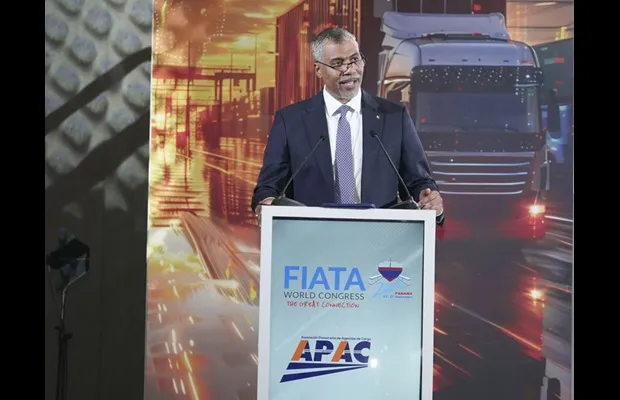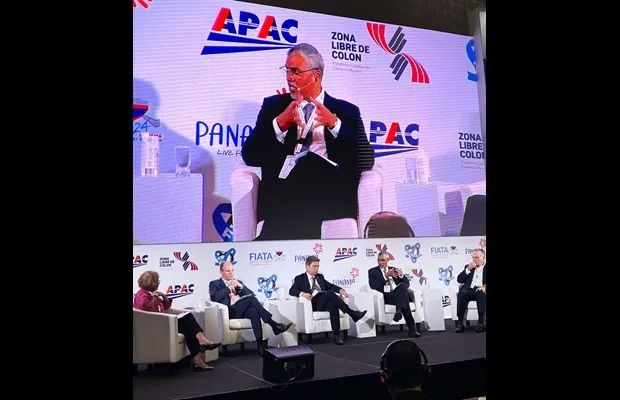
In a demonstration of the World Customs Organization’s (WCO) commitment to strengthening global trade and Customs cooperation, WCO Secretary General Ian Saunders attended the FIATA World Congress in Panama City and the BASC Global Conference in Miami. The WCO’s participation in these events highlighted the strategic importance of collaboration between Customs authorities and private sector stakeholders in addressing the challenges and opportunities within the global logistics industry. As key members of the WCO Private Sector Consultative Group (PSCG), both FIATA and BASC are key partners in strengthening the relationship between Customs and industry.
The FIATA World Congress brought together leading figures from the freight forwarding and logistics industry, emphasizing the critical role of reliable transport in the smooth functioning of global supply chains. During this high-level event, the Secretary General addressed the need for greater resilience and adaptability in the logistics sector, especially in response to emerging global challenges, such as pandemics and health crises, geopolitical tensions, natural disasters, cybersecurity threats, and the effects of climate change.
In his keynote address, the Secretary General praised the collaboration between FIATA and WCO, particularly through FIATA’s active role in the WCO PSCG and the SAFE Working Group. This partnership has been instrumental in driving initiatives that improve Customs procedures, thus facilitating compliance and ensuring the secure movement of goods across borders
The Secretary General emphasized the transformative power of technology in modernizing Customs and logistics operations. He highlighted the strategic importance of Authorized Economic Operator (AEO) programmes and Mutual Recognition Arrangements/Agreements (MRAs) in fostering secure and efficient trade. Additionally, he underscored the ongoing collaboration with FIATA in mapping the FIATA Electronic Bill of Lading (eFBL) to the WCO Data Model, a significant step in advancing transparency, efficiency, and security within international trade frameworks.
During the Congress, Mr. Saunders also participated in a high-level roundtable discussion with international and regional authorities, exploring the benefits and challenges associated with AEO programmes, the growing role of digitalization, and the imperative of strengthening Customs-Industry cooperation to build more resilient and adaptive global supply chains.

Following his participation at the FIATA Congress, the Secretary General attended the 11th BASC Global Conference in Miami, where he delivered the closing remarks. The BASC (Business Alliance for Secure Commerce) Global Conference convened experts in supply chain security to address emerging trends and ongoing challenges in global commerce.
In his address, Mr. Saunders emphasized the need for public-private collaboration in enhancing supply chain security. He recognized the efforts of BASC in advancing the global trade security agenda, particularly as a key member of the WCO PSCG. He also reaffirmed the WCO’s commitment to leveraging cutting-edge technologies such as artificial intelligence and machine learning to revolutionize risk management, compliance, and security in global supply chains.
Reflecting on the theme of the conference, the Secretary General noted the dichotomy between the promise of new technologies and the ongoing challenges of corruption, ethics, and security threats within the supply chain. He urged all stakeholders to focus on supporting Micro- Small- and Medium- size Enterprises (MSMEs), empowering women entrepreneurs, and providing opportunities for developing economies to thrive.
Both FIATA and BASC have been instrumental in advising the WCO on international trade and Customs matters through the PSCG, ensuring that the voice of the industry is heard in shaping global Customs policies.
The Secretary General reiterated the WCO’s vision of a global trade environment where every link in the supply chain is resilient, every transaction is secure, and every business, regardless of size, has the opportunity to flourish. By maintaining strong partnerships with organizations like FIATA and BASC, the WCO continues to play a key role in fostering resilient, sustainable, and secure global supply chains for the future.